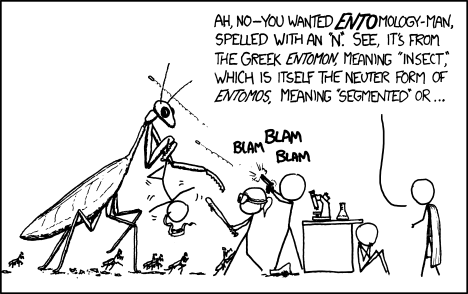Bees don’t die after stinging, only by stinging a big animal or humans, because their sting isn’t made for thick skins but for other insects. In hornets and wasps there isn’t a problem, their stings don’t have barbs.
Silly YouTuber, that’s a flying yellow ant.
Isn’t that a wasp rather than a bee? Whenever I got stung by a wasp that fucker was fine (unless I caught it)!
Story tiem:
I was eating sushi outside on my lunch break, and ofc a local wasp was buzzing around so I moved a chunk of tuna a bit away from me so it would feel safe to land. It landed, cut out an almost perfect square of tuna, hugged it with it’s legs and flew off. It was a bit like watching a cargo helicopter lifting up a container.

Yes, exactly!
I always sacrifice some small piece of fruit or meat to them when the wasps are getting annoying. 65% of the time, it works everytime and they fuck off with their gift and never come back
I don’t negotiate with terrorists. I’ll spray or salt shotgun every winged cunt I see.
I was actually expecting the end of the story to have the wasp at some point sting you just because of existing.
Not all wasps are like that, the smaller mud daubers and such are rather bee-like in their apathy of you being around them. But hornets. Yeah, they’re evil.
But hornets. Yeah, they’re evil.
This might vary by region but here in Central Europe hornets are pretty chill. They don’t stray too far from their nests and eat all sorts of less agreeable critters. If anything smaller wasps have something of a reputation here but they’re really not that bad either unless they gang up on you. Most encounters go south because people start flailing about. If you remain calm and careful not to squash them you can simply coexist.
Hornets look scary as fuck but you are right that they are very chill. And they don’t tend to live near houses as much as the common wasp. But I think the hornets in North America are the same. Introduced by Europeans. Maybe they are more aggressive in North America, maybe Americans just don’t know how aggressive wasps can be.
He understood the wasp, maybe they’re so ornery because no one understands what they want. He’s The Wasperer.
OTOH, I’d bet it will return and harass and probably sting the next customer that doesn’t give it a piece of their tuna sushi.
All wasps are an important part of the decomposition cycle. Some also tend to decompose your happiness.
This happened to me when I was a kid. My family was having a picnic which included the rare treat of fried chicken. A wasp buzzed down, landed on my chicken and sawed away a chunk of it. Then it took off, faltered because the chunk was so heavy, then buzzed away. Your comparison to a helicopter is spot on! We all just sat there and watched it, not knowing what to do. We still talk about how weird that was.
Etymologist: [visible confusion]
xkcd reference!

Endocrinologist: [visible confusion]
That’s the joke here? I’m not an entomologist
It’s shows a wasp and not a bee…
No expert, but I believe the picture is of a wasp.
yellowjacket specifically, wasp is a very broad term, it’s like calling a cat “a mammal”
Bees and wasps, while both belonging to the Hymenoptera order, diverged within the superfamily Apoidea. Specifically, bees are thought to have evolved from predatory wasps, primarily within the family Crabronidae. Phylogenetic analysis suggests that bees are nested within a paraphyletic Crabronidae.
-An expert, or something
So what I am hearing you say is that bees are wasps.
And upon further examination, ants are wasps.
They are dying after sexy time I think.
I’m not sure whether you are making a joke?
The vast majority of bees, wasps, ants and any other hive insects you’ll see, are infertile drones. With each hive housing only a single female individual capable of sexual reproduction, which does not leave the hive after it forms.
Fertile males only exist for a short time during swarming season, and they do die after doing their thing.
Not wasps. The majority of wasps you’ll see are fertile.
Also, insect hives can house several fertile females. Some exist around a single queen, but they are an exception, not the norm.














